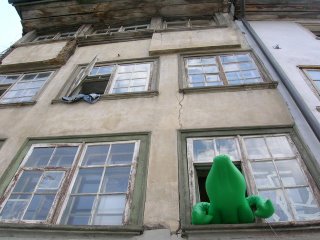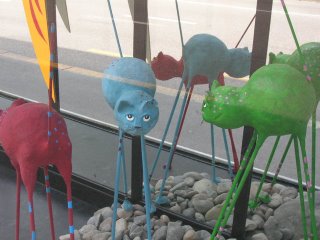I have come across those lyrics in a song I heard on the radio and it somehow fascinated me..Page Four
'Wear Sunscreen' was written by Mary Schmich, a columnist for the Chicago Tribune. Originally printed in a newspaper column, this now famous poem was e-mailed around the world, identified as an M.I.T. commencement speech by author Kurt Vonnegut. The false attribution was never explained, but the poem became an Internet favorite; it was later set to music and released on an album by Australian director Baz Luhrmann.
If I could offer you only one tip for the future, sunscreen would be it. The long-term benefits of sunscreen have been proved by scientists, whereas the rest of my advice has no basis more reliable than my own meandering experience. I will dispense this advice now.
Enjoy the power and beauty of your youth.
Oh, never mind.
You will not understand the power
and beauty of your youth until they've faded.
But trust me, in 20 years, you'll look back at photos of
yourself and recall in a way you can't grasp now how much
possibility lay before you and how fabulous you really looked.
You are not as fat as you imagine.
Don't worry about the future.
Or worry, but know that worrying is as effective as
trying to solve an algebra equation by chewing bubble gum.
The real troubles in your life are apt to be things
that never crossed your worried mind, the kind that
blindside you at 4 pm on some idle Tuesday.
Do one thing every day that scares you.
Sing.
Don't be reckless with other people's hearts.
Don't put up with people who are reckless with yours.
Floss.
Don't waste your time on jealousy.
Sometimes you're ahead,
sometimes you're behind.
The race is long and, in the end,
it's only with yourself.
Remember compliments you receive.
Forget the insults.
If you succeed in doing this, tell me how.
Keep your old love letters.
Throw away your old bank statements.
Stretch.
Don't feel guilty if you don't know
what you want to do with your life.
The most interesting people I know didn't know at
22 what they wanted to do with their lives. Some
of the most interesting 40-year-olds I know still don't.
Get plenty of calcium.
Be kind to your knees.
You'll miss them when they're gone.
Maybe you'll marry, maybe you won't.
Maybe you'll have children, maybe you won't.
Maybe you'll divorce at 40,
maybe you'll dance the funky
chicken on your 75th wedding anniversary.
Whatever you do, don't congratulate yourself
too much, or berate yourself either.
Your choices are half chance.
So are everybody else's.
Enjoy your body.
Use it every way you can.
Don't be afraid of it or of what other people think of it.
It's the greatest instrument you'll ever own.
Dance,
even if you have nowhere to do it but your living room.
Read the directions,
even if you don't follow them.
Do not read beauty magazines.
They will only make you feel ugly.
Get to know your parents.
You never know when they'll be gone for good.
Be nice to your siblings.
They're your best link to your past and the people
most likely to stick with you in the future.
Understand that friends come and go,
but with a precious few you should hold on.
Work hard to bridge the gaps in geography and lifestyle,
because the older you get, the more you need the
people who knew you when you were young.
Live in New York City once, but leave before it
makes you hard. Live in Northern California
once, but leave before it makes you soft.
Travel.
Accept certain inalienable truths:
Prices will rise.
Politicians will philander.
You, too, will get old.
And when you do, you'll fantasize that when you
were young, prices were reasonable, politicians
were noble, and children respected their elders.
Respect your elders.
Don't expect anyone else to support you.
Maybe you have a trust fund.
Maybe you'll have a wealthy spouse.
But you never know when either one might run out.
Don't mess too much with your hair or by the
time you're 40 it will look 85.
Be careful whose advice you buy,
but be patient with those who supply it.
Advice is a form of nostalgia.
Dispensing it is a way of fishing the past from the disposal,
wiping it off, painting over the ugly parts
and recycling it for more than it's worth.
But trust me on the sunscreen.
Mary Schmich
( newspaper columnist with the Chicago Tribune )










